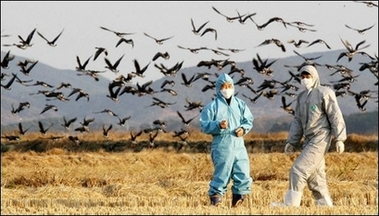South Korea to kill cats, dogs in fear of bird flu
(AP)Updated: 2006-11-27 23:05
SEOUL, South Korea - South Korea plans to kill cats and dogs to try to prevent the spread of bird flu after an outbreak of the deadly H5N1 virus at a chicken farm last week, officials said Monday.
Animal health experts, however, suggested it was "a bit of an extreme measure" when there was no scientific evidence to suggest that cats or dogs could pass the virus to humans.
Quarantine officials have already killed 125,000 chickens within a 1,650-foot radius of the outbreak site in Iksan, about 155 miles south of Seoul, the Agriculture Ministry said. Officials began slaughtering poultry on Sunday, a day after they confirmed that the outbreak was caused by the H5N1 strain.
They plan to slaughter a total of 236,000 poultry, as well as other animals, including pigs, and all dogs and cats in the area by Thursday, the ministry said. About 6 million eggs also will be destroyed, it said. The ministry did not say how many dogs, cats and other animals would be killed.
Slaughtering cats and dogs near an area infected with bird flu would be highly unusual in Asia. Indonesia has killed pigs in the past, but most countries concentrate solely on destroying poultry.
However, it would not be the first time for South Korea to kill cats and dogs due bird flu concerns. An official at the Agriculture Ministry said South Korea slaughtered cats and dogs along with 5.3 million birds during the last outbreak of bird flu in 2003.
The official declined to be named, saying he was not authorized to talk to media.
Dogs specially bred for eating are slaughtered for consumption in South Korea, where many people enjoy dog meat as a delicacy.
Another ministry official, Kim Chang-sup, insisted killing cats and dogs to curtail the spread of bird flu was not unusual.
"Other countries do it. They just don't talk about it," Kim said, adding that all mammals are potentially subject to the virus. He declined further comment.
But animal experts disputed the validity of killing cats and dogs.
"It's highly unusual, and it's not a science-based decision," said Peter Roeder, a Rome-based animal health expert with the U.N.'s Food and Agricultural Organization or FAO, who published research about cats and bird flu earlier this year in the journal Nature. "We've got absolutely no reason to believe they're important," he told The Associated Press.
Dr. Jeff Gilbert, an animal health expert at the FAO in Vietnam, described South Korea's plan as "a bit of an extreme measure."
He said dogs and cats occasionally become infected, but pose little risk to people.
Tigers and snow leopards in a Thailand zoo died in 2003 and 2004 after being fed infected chicken carcasses. Earlier this year, a few domestic cats tested positive for the virus in Europe.
The H5N1 virus began ravaging Asian poultry stocks in late 2003 and has killed at least 153 people worldwide.
So far, the disease remains hard for people to catch, and most human cases have been traced to contact with infected birds. But experts fear it will mutate into a form that is easily spread among people, possibly creating a pandemic that could kill millions.
|
||
|
||
|
|

